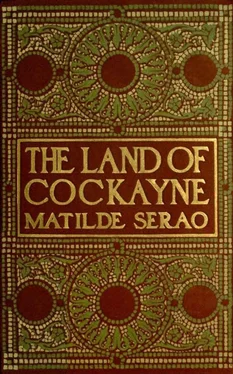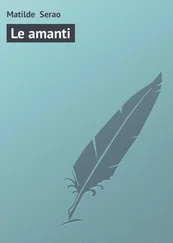Matilde Serao - The Land of Cockayne
Здесь есть возможность читать онлайн «Matilde Serao - The Land of Cockayne» — ознакомительный отрывок электронной книги совершенно бесплатно, а после прочтения отрывка купить полную версию. В некоторых случаях можно слушать аудио, скачать через торрент в формате fb2 и присутствует краткое содержание. Жанр: unrecognised, на английском языке. Описание произведения, (предисловие) а так же отзывы посетителей доступны на портале библиотеки ЛибКат.
- Название:The Land of Cockayne
- Автор:
- Жанр:
- Год:неизвестен
- ISBN:нет данных
- Рейтинг книги:3 / 5. Голосов: 1
-
Избранное:Добавить в избранное
- Отзывы:
-
Ваша оценка:
- 60
- 1
- 2
- 3
- 4
- 5
The Land of Cockayne: краткое содержание, описание и аннотация
Предлагаем к чтению аннотацию, описание, краткое содержание или предисловие (зависит от того, что написал сам автор книги «The Land of Cockayne»). Если вы не нашли необходимую информацию о книге — напишите в комментариях, мы постараемся отыскать её.
The Land of Cockayne — читать онлайн ознакомительный отрывок
Ниже представлен текст книги, разбитый по страницам. Система сохранения места последней прочитанной страницы, позволяет с удобством читать онлайн бесплатно книгу «The Land of Cockayne», без необходимости каждый раз заново искать на чём Вы остановились. Поставьте закладку, и сможете в любой момент перейти на страницу, на которой закончили чтение.
Интервал:
Закладка:
Placidly, as if he was taking a note of a bill of exchange, Don Gennaro Parascandolo put down the remark in his note-book. Don Domenico Mayer took it, too, hiding behind a curtain, without losing his bureaucratic and misanthropic gravity. The old Marchioness, who was deaf, went about asking wildly: 'What did he say? What did he say?' She ended by asking Luisa Fragalà, who sat motionless with staring eyes beside the melancholy Signora Parascandolo. Luisa could only say: 'I don't know, my lady; I did not hear.' However, Don Parascandolo was not satisfied; he went on:
'Did you enjoy the sweets, Don Pasqualino? I noticed you seemed to like them.'
'Yes,' he muttered; 'I eat, but I don't masticate.'
'Have you no teeth?'
'No, I have not.'
He cast his eyes around vaguely, without meeting anyone's glance, as if he saw things from beyond, and made a sign with his hand, leaning three fingers on his cheek.
Again the same murmur and agitation; there was uncertainty, too. The phrase was ambiguous, very. What did the motion with three fingers mean? Even Don Gennaro Parascandolo, whilst taking a note, stopped to think. The mystery of that second phrase, of the gesture, let loose all these already shuddering fancies of a supernatural world. Faith, faith, that was what was needed to understand the medium's words! Everyone, calling together all the powers of his soul, tried to have a sublime burst of faith, to know the truth, how to translate it into numbers, to exchange it into lottery money.
Late at night, when the house was emptied of people, Cesare Fragalà, with the sleepy servants, went putting out the lights, shutting the doors, as he prudently did every evening. When he came back to the bedroom, he found Luisella sitting half dressed in the shade.
Agnesina's cradle had been taken into the nurse's room; the couple were alone. Fatigue seemed to keep them silent. Still, on coming up to his young wife, he saw she was crying quietly, big tears rolling down her cheeks.
'What is the matter, Luisella? what is it?' kissing her, trembling with emotion himself.
'There is nothing the matter,' she said, still weeping silently in the shadow.
CHAPTER III – IN THE CAVALCANTIS' HOUSE
Prostrate on the dark old carved wood kneeling-desk, her elbows resting on velvet cushions, head slightly bent, her face hidden in her hands, Donna Bianca Maria Cavalcanti seemed to meditate after praying. As long as twilight lighted up the little private chapel the girl went on reading a chapter of the 'Imitation of Christ,' attentively, in her usual thoughtful attitude. But the shadows had grown deeper round her, first faintly purple, then gray, enfolding the little altar and a figure of Our Lady of Sorrows, with seven silver swords radiating from her heart, hiding a three-quarter figure of Jesus Christ bound to the column, the Ecce Homo, crowned with thorns, and bleeding in the face, hands, and side, blotting out Bianca Maria's slender, neat figure. Then she quietly closed the torn volume, put it on the cushion, and hid her face in her hands. Only the faint light before Our Lady of Sorrows shone on the white, clasped hands and the knot of dark brown hair on her neck. She kept so motionless for some time that the white figure in the shadow of the little chapel looked like one of those praying statues that medieval piety placed on tombs to kneel in constant prayer. She seemed not to feel the hours passing over her nor the faint, cold breath the autumn evening brought into the chapel. Gazing through her fingers at the Virgin's sad face, she seemed to go on praying and meditating as if nothing could wrest her from it.
Still, as evening came on the little chapel got very gloomy. In the daytime it was a poor, cold place, being only a narrow inside room, badly lighted by a window looking into a narrow court of the Rossi, formerly the Cavalcanti Palace. Once a wretched carpet covered the floor, but it was so old and dusty that Bianca Maria had it taken away. The floor was bare now, of shiny, icy bricks. The little altar was painted dull blue, an ecclesiastical shade, covered by a rather fine bit of linen, though yellow with age, as was also the lace round it. Everything was old and shabby—the candle-sticks, the printed prayers in metal cases, the red-leather-covered missal, the poor silver sprays of leaves placed as sacred ornaments, and the little gilt wooden door, behind which was the Pyx. By day Our Lady of Sorrows, in black silk, embroidered in gold, with a batiste nun's head-dress, and the seven swords in her heart, looked wretched and poor, carrying a lace and batiste handkerchief in her pink stucco hands. The great Ecce Homo, too, life size, of wood and stucco, looked as poor as its surroundings. In spite of the carved wood chairs, with the Cavalcanti crest on the velvet cushions, the chapel had a look of frozen wretchedness, showing by daylight faded colours, tarnished metals, stains in the velvet. Even the two lamps that burned night and day before the Virgin and the Saviour were only two yellow sputtering tongues of flame.
But at night—and that night, curiously enough, only one lamp was burning, that before the Virgin—the wretchedness disappeared; only great fluttering shadows filled the chapel. One could not see the colour of the wood and metal; only the white altar-cloth was visible. There were no sparks of brightness, only in the trembling light Mary's sad face seemed agonized; and as the flame, shaken by an invisible breath of wind, bent to the right or left, Jesus' hands and side seemed really to bleed.
Bianca Maria was deep in thought, and, accustomed to the chapel, she felt neither the cold nor the gloom. Suddenly she trembled, thinking she heard a great noise in the room. It was then she noticed the lamp before Christ was out. She shivered with cold and fear. The Virgin seemed to weep over her bleeding Son's agony. Bianca Maria went quickly out of the chapel, taking her book with her, crossing herself hurriedly as if followed by some evil spirit.
In the antechamber an old servant in the Cavalcanti livery—dull blue, piped with white—sat reading an old newspaper by the light of one of those old brass lamps with three spouts one still sees in the provinces and in very aristocratic houses. He rose as he heard Bianca Maria's light step, looking her in the eyes.
'Giovanni,' she said, in her pure harmonious voice, 'in the chapel the lamp before the Ecce Homo has gone out.'
The old servant looked at her, and hesitated a little before answering.
'I did not light it,' he then muttered, casting down his eyes, and crushing up the paper in his lean hands.
'Perhaps you had no oil?' she asked, with a little tremor in her voice, turning her anxious face towards him.
'No, my lady, no,' the servant eagerly answered at once. 'There is lots of oil in the pantry. It was by the Marquis's orders I did not light the lamp.'
'Did he give you such an order?' she asked, amazed, arching her eyebrows.
'Yes, my lady.'
'For what reason?'
But she regretted the question at once. It seemed to fail in the profound respect she owed her father. Still, the word had rushed out. She would have liked to go away and not hear the answer, whatever it was; but she feared to make matters worse, and listened with open eyes, ready to restrain her astonishment and fear.
'The Marquis is in a rage with Jesus Christ,' the servant said, in that humble but familiar tone in which the common folk in Naples often speak of the Deity. 'Last Saturday he asked a great favour of that miracle-working Ecce Homo, but he did not get it. Then the Marquis gave orders the lamp was not to be lighted again.'
'Did the Marquis tell you that?'
'Yes, my lady; but if you like, I will go and light it.'
'Obey the Marquis,' she murmured coldly, as she went on towards the drawing-room.
Читать дальшеИнтервал:
Закладка:
Похожие книги на «The Land of Cockayne»
Представляем Вашему вниманию похожие книги на «The Land of Cockayne» списком для выбора. Мы отобрали схожую по названию и смыслу литературу в надежде предоставить читателям больше вариантов отыскать новые, интересные, ещё непрочитанные произведения.
Обсуждение, отзывы о книге «The Land of Cockayne» и просто собственные мнения читателей. Оставьте ваши комментарии, напишите, что Вы думаете о произведении, его смысле или главных героях. Укажите что конкретно понравилось, а что нет, и почему Вы так считаете.












